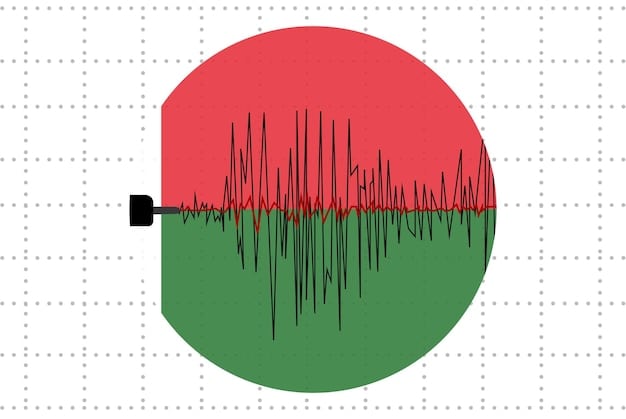New Podcast Advertising Regulations in US: Impact on Podcast Revenue Streams

New podcast advertising regulations in the US aim to increase transparency and protect consumers, potentially reshaping how podcasters generate revenue through ads.
The landscape of podcast advertising in the US is evolving, with new regulations on the horizon. How will these changes affect your podcast’s revenue streams? Let’s dive into the details of these upcoming guidelines and explore their potential impacts on the industry.
Understanding the New Podcast Advertising Regulations
Navigating the legal landscape of podcast advertising can be complex. New regulations are being introduced to ensure transparency and protect consumers. These changes are not just a formality; they directly impact how podcasters can monetize their content.
These regulations aim to provide clarity on what constitutes deceptive advertising and require greater disclosure from advertisers and podcasters alike. Failing to comply with these rules can result in hefty fines and damage to your podcast’s reputation.
Key Components of the Regulations
Several key components make up these new regulations. Let’s break down some of the most significant aspects:
- Transparency in Sponsorships: Clear and conspicuous disclosure of sponsored content is essential. Listeners must be able to easily identify when a podcast segment is paid advertising.
- Truth in Endorsements: Endorsements must reflect the genuine opinions of the podcaster or influencer. False or misleading claims are strictly prohibited.
- Data Privacy: Regulations regarding the collection, storage, and use of listener data are becoming more stringent. Podcasters need to ensure they comply with these data privacy requirements.
- Accessibility Standards: Making podcast content accessible to individuals with disabilities, including providing transcripts and captions, is increasingly important.
These key areas highlight the increasing focus on ethical and legal standards within the podcasting industry. Ignoring these components could lead to significant repercussions.

In conclusion, understanding these new regulations is critical for anyone involved in podcast advertising. By staying informed and proactive, you can ensure your podcast remains compliant and continues to thrive in this evolving environment.
How the Regulations Will Impact Revenue Streams
The introduction of new advertising regulations will inevitably affect the revenue streams of podcasters. While these regulations are designed to protect consumers, they also necessitate a re-evaluation of traditional monetization strategies.
One of the most significant changes is the need for greater transparency in advertising. This means clearly disclosing when a podcast segment is sponsored or includes affiliate links.
Potential Impacts on Advertising Revenue
The impact on advertising revenue could be multifaceted:
- Increased Compliance Costs: Podcasters may need to invest in tools and processes to ensure they comply with the new regulations, adding to their operational costs.
- Potential Revenue Decline: Stricter regulations on endorsements and sponsorships could lead to a decrease in advertising revenue as some advertisers may be hesitant to comply.
- Shift Towards Ethical Advertising: The focus on transparency and honesty could lead to a shift towards more ethical advertising practices, attracting advertisers who value integrity.
These potential impacts highlight the need for podcasters to adapt their revenue strategies to the new regulatory landscape.
Conversely, some argue that these regulations could enhance listener trust, leading to greater engagement and potentially higher ad rates. A more informed and trusting audience might be more receptive to advertising.

To conclude this section, the long-term impacts on revenue remain uncertain, the initial transition period may present challenges as podcasters and advertisers adjust to the new norms.
Strategies for Adapting to the New Rules
Adapting to new advertising regulations requires a proactive and strategic approach. Podcasters need to develop strategies that ensure compliance while maintaining or even enhancing their revenue streams.
One key strategy is to prioritize transparency in all advertising endeavors. This involves clearly disclosing sponsored content and ensuring that endorsements are genuine and based on personal experience.
Practical Adaptation Strategies
Here are some practical steps podcasters can take:
- Implement Clear Disclosure Policies: Develop and enforce clear policies for disclosing sponsored content and affiliate links.
- Invest in Compliance Training: Provide training to your team on the new regulations and best practices for compliance.
- Review Existing Advertising Agreements: Ensure that all existing advertising agreements comply with the new regulations.
- Focus on Building Trust: Prioritize building trust with your audience by being transparent and honest in all your communications.
By implementing these strategies, podcasters can navigate the new regulatory landscape and maintain a strong relationship with their audience.
Another effective approach is to diversify revenue streams beyond traditional advertising. This could include offering premium content, merchandise, or live events.
In closing, adapting to new advertising regulations is an opportunity to strengthen your podcast’s brand and build long-term sustainability.
Diversifying Your Podcast Revenue Streams
Relying solely on advertising for revenue can be risky, especially with evolving regulations. Diversifying your income sources provides a more stable and resilient financial foundation for your podcast.
There are several alternative revenue streams that podcasters can explore, including subscriptions, crowdfunding, merchandise, and live events.
Exploring Alternative Monetization Methods
Let’s delve into some of these alternative methods:
- Subscriptions: Offer premium content or ad-free listening experiences to subscribers.
- Crowdfunding: Use platforms like Patreon to solicit donations from loyal listeners.
- Merchandise: Sell branded merchandise, such as t-shirts, mugs, and stickers, to your audience.
- Live Events: Host live podcast recordings, workshops, or meetups to generate revenue and engage with your fans.
These alternative methods can complement traditional advertising revenue and create a more sustainable business model.
Additionally, consider forming partnerships with other businesses or organizations to create collaborative content or cross-promote each other’s products or services.
In conclusion for this part, diversifying your revenue streams can provide greater financial stability and reduce your reliance on advertising revenue.
Best Practices for Podcast Advertising
Even with new regulations in place, there are still best practices that podcasters should follow to ensure their advertising efforts are effective and ethical. These practices revolve around transparency, honesty, and respect for the audience.
One of the most important best practices is to clearly disclose any sponsored content or affiliate links. This helps maintain trust with your audience and ensures compliance with regulations.
Key Advertising Practices for Podcasts
Consider these advertising practices:
- Be Transparent: Clearly disclose all sponsored content and affiliate links.
- Be Honest: Ensure that endorsements are genuine and based on personal experience.
- Be Relevant: Choose advertisers and products that are relevant to your audience.
- Be Respectful: Avoid intrusive or overly aggressive advertising tactics.
These practices contribute to a positive advertising experience for both podcasters and listeners.
Furthermore, it’s essential to monitor the performance of your advertising campaigns and make adjustments as needed. This involves tracking key metrics such as click-through rates, conversion rates, and listener feedback.
Summing up, adhering to best practices can enhance the effectiveness of your advertising efforts and build a stronger relationship with your audience.
Future Trends in Podcast Advertising
The podcast advertising landscape is constantly evolving, driven by technological advancements and changing consumer preferences. Staying ahead of these trends is essential for podcasters who want to remain competitive.
One emerging trend is the use of dynamic ad insertion (DAI), which allows podcasters to insert targeted ads into their content based on listener demographics and preferences.
Emerging Advertising Trends
Let’s look at the future trends:
These trends are reshaping the future of podcast advertising, creating new opportunities for podcasters and advertisers alike. The emphasis on personalization and data-driven advertising is likely to increase.
Looking ahead, artificial intelligence (AI) is also expected to play a significant role in podcast advertising. AI-powered tools can help podcasters automate tasks such as ad placement, targeting, and reporting. Additionally, AI can enhance the listener experience by providing personalized recommendations and content.
To sum up, by staying informed about future trends, podcasters can position themselves for success in the evolving podcast advertising marketplace.
| Key Concept | Brief Description |
|---|---|
| 📢 New Regulations | Focus on ad transparency and consumer protection in US podcasting. |
| 💸 Revenue Impact | Potential changes in ad revenue due to compliance costs and ethical shifts. |
| 🛡️ Adaptation | Strategies to comply with rules while maintaining audience trust. |
| 💡 Diversification | Exploring alternative revenue streams beyond advertising. |
FAQ Section
▼
The primary focus is on increasing transparency and protecting consumers by ensuring that advertisements are clearly disclosed and not misleading.
▼
Initially, compliance costs may increase. However, ethical advertising might attract a trusting audience, potentially increasing ad rates in the long run.
▼
Adopting clear disclosure policies, investing in compliance training, and reviewing ad agreements are crucial steps for adherence to regulations.
▼
Podcasters can explore subscriptions for premium content, crowdfunding through platforms like Patreon, merchandise sales, and hosting live recording or meetups.
▼
Keep an eye on dynamic ad insertion (DAI) for targeted promotion and AI-enhanced tools that personalize audience experience.
Conclusion
Navigating the **new podcast advertising regulations in US** represents both a challenge and an opportunity for podcasters. By staying informed, adapting strategies, and prioritizing transparency, you can ensure compliance and build a sustainable, thriving podcast business.





